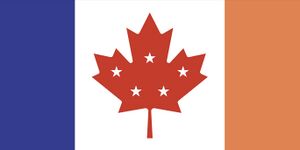Delamarians: Difference between revisions
Jump to navigation
Jump to search
No edit summary |
No edit summary |
||
| Line 9: | Line 9: | ||
| languages = {{wp|Canadian English|Delamarian Anglish}}{{·}}{{wp|French language|Lysian}}{{·}}{{wp|Dutch language|Variot}} | | languages = {{wp|Canadian English|Delamarian Anglish}}{{·}}{{wp|French language|Lysian}}{{·}}{{wp|Dutch language|Variot}} | ||
| religions = Primarily Christian and Non-religious, with Salam and Yehuda minorities. | | religions = Primarily Christian and Non-religious, with Salam and Yehuda minorities. | ||
| related = [[Fravinians]], [[Anglians]] | | related = [[Fravinians]], [[Anglians]], [[Lysians]] | ||
| native_name = | | native_name = | ||
| native_name_lang = | | native_name_lang = | ||
Revision as of 18:00, 13 January 2022
 | |
| File:Map of the Delamarian Diaspora.png Map of the Delamarian diaspora in the world | |
| Regions with significant populations | |
|---|---|
| 40,170,000 | |
| Languages | |
| Delamarian Anglish · Lysian · Variot | |
| Religion | |
| Primarily Christian and Non-religious, with Salam and Yehuda minorities. | |
| Related ethnic groups | |
| Fravinians, Anglians, Lysians | |
Delamarians (Lysian: Delamariennes) are people identified with the country of Delamaria. This connection may be residential, legal, historical or cultural. For most Delamarians, many (or all) of these connections exist and are collectively the source of their being Delamarian.
Most Delamarians trace ancestry back to Great Anglia and Lysia, which maintained major colonies in Delamaria from the 16th century to the 18th. There are also sizable Variot groups in Vandergart and Nassaua, which were also colonies within the same timespan.